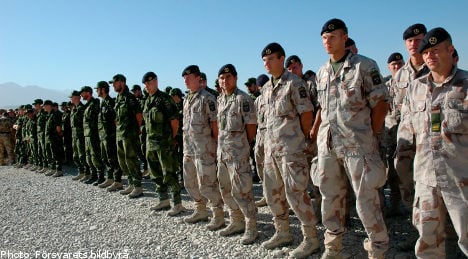This means that the 600 employees, around 3.5 percent of Armed Forces staff risk being made redundant on the grounds of shortage of work.
“There is also a hidden figure of around 350 people who have not replied,” said human resources director Per-Olof Stålesjö in a web broadcast to staff.
These people will now be re-contacted, Sålesjö said.
The Armed Forces’ operations manager, Lieutenant-General Anders Lindström, also attended the information broadcast. He expressed a hope that the number who had turned down the contract would have been fewer, but was satisfied with the results.
The new contract was issued in June on the instructions of commander-in-chief of the Armed Forces, Sverker Göransson. All employees, including civil employees, were given until September 20th to decide.
The demand to sign a new employment contract does not apply to officers who had joined the Armed Forces after 2004, as it was then made obligatory to submit to foreign duty.
According to Stålesjö, there is no single personnel group which is overrepresented among the 600 staff which have declined foreign duty and thus their jobs within the Armed Forces.
“There is a very broad spread, both officers and civilians,” he said.
“We will now over the next two weeks work with the 600 who said no as well as the 350 who have not answered,” he said.
The Armed Forces personnel welfare board will study whether any of the affected staff members have expertise that the Armed Forces should take into account on operational reasons.
The review is expected to be completed by October 14th.
“We will then be able to give confirmation to each and every one and the redundancy date is planned as October 31st,” Stålesjö said.
The decision by commander-in-chief Sverker Göransson to issue the new contract, has drawn criticism from some quarters, including the Swedish Military Officers’ Association (Officersförbundet).
“We feel completely steamrollered,” said chairperson Lars Fresker in a statement on Friday.
Lars Fresker is highly critical of how the issue has been managed by the military authorities and considers the most serious part to be that members don’t know what it is they are signing up to.
“The details over how often the postings would occur, and possible exceptions regarding having small children, or sickness, are not clear. There is a significant level of concern among members,” he said.
Fresker also questioned why there are large numbers of administrative staff also covered by the new requirements.
“There are groups such as economists, pay administrators that we do not understand why they should be covered by this. Are they going to sit in Afghanistan and pay out salaries,” said Lars Fresker.
The uniform contracts have been defended by Per-Olof Stålesjö on solidarity grounds, and are a result of a decision by the government and parliament over the direction of the Swedish Armed Forces, where the focus has been shifted towards operational units serving abroad.



 Please whitelist us to continue reading.
Please whitelist us to continue reading.
Member comments